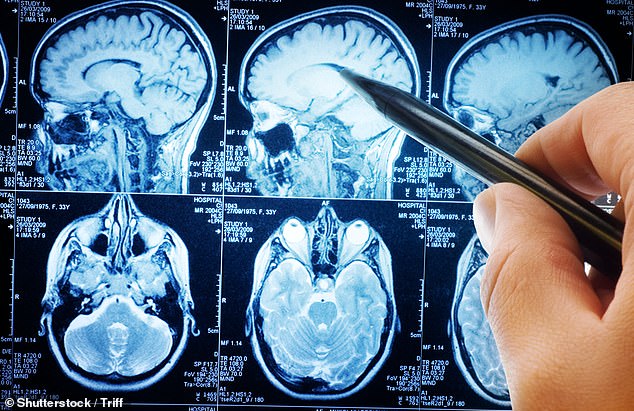People with depression have a part of their brain almost twice as large as that of healthy individuals, US researchers have discovered.
Interestingly, this difference means that signs of this mental health problem could be detected in children as young as 10, before symptoms begin to appear later.
Experts hope their discovery could form the basis for future therapeutic treatments that address harmful structural differences in the brain.
Publishing their results in NatureExperts at Weill Cornell Medical Institute in New York analyzed brain scans of 141 adults with depression and compared them with 37 controls.
They found that a set of brain parts involved with attention to rewards and threats, called the frontostriatal salience network, was larger in those with depression.
People with depression have a part of their brain almost twice as large as that of healthy people, US research suggests. File image
The researchers then examined whether this difference in brain structure could be found among children before they developed depression in adolescence.
To do this, they examined images of 57 children taken when they were between 10 and 12 years old and who subsequently developed depression at 13 or 14 years old.
The authors compared these scans with an equal number of children from the same study who did not develop depression.
They found that the frontostriatal salience network in children who developed depression was about one-third larger than in controls.
The authors wrote: ‘These results show that cortical expansion of the salience network is a trait-like feature of brain network organization that is stable over weeks, months, and years, is unaffected by mood, and is detectable in children before the onset of depressive symptoms in adolescence.’
They said their results suggest that children’s brain scans could potentially be used as a marker of risk for depression in adolescence.
However, they added that further studies are needed to confirm their findings.
According to data from the Office for National Statistics (ONS), around one in six adults in the UK experienced moderate to severe depressive symptoms in 2022.
This is also because earlier this year it was revealed that almost a quarter of children in England now have a “probable mental disorder”, according to a report by the ONS.
The rate of these disorders, recorded from the responses to a questionnaire of young people between the ages of eight and sixteen, is increasing.
The 2023 data suggested that 23.3 percent of children had a probable mental disorder, such as anxiety or depression, up from 19 percent the previous year.
Experts have previously highlighted the impact of the Covid pandemic and the disruption it caused to children’s education and social lives, along with the cost of living crisis and social media as detrimental factors to children’s mental wellbeing.
While most people go through periods of feeling down, those who feel persistently sad for weeks or months are urged to seek help from their GP.
Treatment for depression varies depending on the severity; in milder cases, your GP may suggest exercise or talking therapies.
Patients with severe cases may be prescribed a combination of therapy and medications such as antidepressants.


